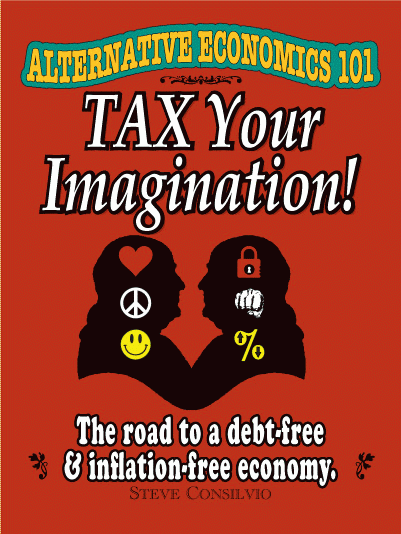Book Cover: TAX Your Imagination! by Steve Consilvio
1. Money
Inflation and debt are wreaking havoc on mankind. Because of these imbalances, jobs related to finance and "selling stuff' are widespread. We are inundated with advertising, false promises and fear. Earning money, by any means possible, is the baseline for survival. Farmers are worried about the Futures value of their crop as much as they are about the weather. They can feed hundreds and thousands of people, but they are not sure if they will be able to feed themselves. The difference between production and consumption can be described as The Fiscal Gap. The value of labor evaporates into a maze of numbers and drives an unending desperation.
Large organizations survive primarily because of access to credit. Size is not the problem. Big organizations are necessary to service large populations and build complex products. Attacking the existence of corporations is like destroying the forest to liberate the trees. Small and large businesses need to co-exist, and individuals with them.
Self-sufficiency is obsolete. Large populations cannot be supported without trade. The modern world is co-dependent, and finance is a constant problem. A debate rages concerning who or what caused the money problem and the best way to solve it. The fear surrounding money is as visceral as hunger.
Money separates man from animals. Animals may fight over territory, mates and food, but never over money or religion. Man, in contrast, is driven and controlled by the importance of abstract ideas. Money is an abstract idea, just like religion. Abstract thought gives us the ability to think, cooperate and build, but money also shares characteristics with mental illnesses.
Money gives man both great joy and great trouble. Man will steal, cheat, lie and kill for money. He will lose sleep with worry or excitement. Man will sell his pride, his dignity and his body for money. Money is a tool that can be used to bully individuals, businesses or nations. Almost everyone has been on both the giving and receiving end of monetary punishment and reward. The belief that money is real makes man both strong and weak, happy and sad, intelligent and crazy.
The rich have lots of money, but they cannot escape the worries of the poor who have little. The rich find themselves with a burden to protect their money from others. Money does not buy freedom, as every hobo knows, but often demands more vigilance. The poor majority constantly complain about the wealthy minority. The wealthy have advice and sympathy for the poor. Nobody wants to be poor or to stay poor, or for the poor to even exist.
The Past and Future
The discussion about money has lasted centuries over similar issues: taxes, prices, privileges, debts, needs and budgets. None of this angst would be possible without first accepting intellectually that money is real and a necessary part of society.
The obsolescence of money is usually a key element of the imaginative future. Science-fiction stories like Star Trek depict the end of money and substitutes a vaguely defined credit system. Today, however, money continues to be accepted as the supreme arbitrator of fairness and value. We are all enslaved by a belief of what constitutes a fair exchange in the trade contract. We seldom agree, but we tolerate one another enough that we can trade regularly. When values change, it is either good or bad for a particular party. We have recently seen the price of gold increase, and people are trading their colored dirt (gold) for colored paper (dollars). This is the trading of one object of abstract value for another object of abstract value.

The Gold Exchange by unknown
While gold has practical usage applications, money does not. Money's only purpose is as a chit in trade. Money can be whatever the parties agree to value. Money is an intellectual agreement. In the past, books, pepper, beads and tulip bulbs have all been used as currency. Star Trek credits are just an electronic version of traditional money. With computerized banking and finance, it is fair to say that the future has arrived. Most money today exists as an electronic entry in a numeric ledger.
Money is a benign tool that allegedly facilitates cooperation. It is quid pro quo; this object for that object. Whether moral, amoral or immoral, it is usually for sale. Money, in theory, makes trade easier by providing an impartial choice to every transaction. People can sell whatever they have to anyone, rather than barter with a specific person who has what they need and wants what they have. Money dramatically increases the opportunity to buy and sell every product. It is an efficient idea on the surface, but we have thousands of years of empirical evidence that money is a complex problem, too.
Money is an idea just like any other idea; it can be true or false, good or bad, right or wrong. The young, like Adam and Eve, have no understanding of money. Money is a concept that must be learned, the same as nakedness. A child grows believing that everything is free and shared, and he must learn of the cost, method and effort required to earn money from strangers. He is taught to count, to share, to charge, to save, to spend, to invest, to plan and to complain. Innocence is lost. Money is a source of embarrassment. We hide our finances the same way we cover our nudity. Money is the shame of mankind.
Money Between Generations
(Note: You can view every article as one long page if you sign up as an Advocate Member, or higher).






